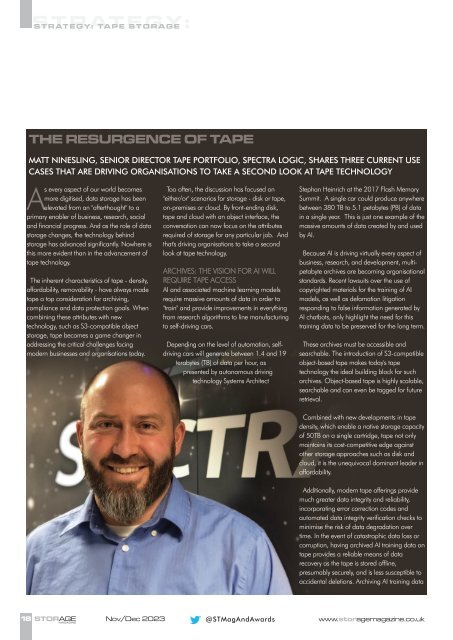ST Nov-Dec 2023
You also want an ePaper? Increase the reach of your titles
YUMPU automatically turns print PDFs into web optimized ePapers that Google loves.
Spectra 18.qxd 01-<strong>Dec</strong>-23 10:59 AM Page 2<br />
<strong>ST</strong>RATEGY: TAPE <strong>ST</strong>ORAGE<br />
THE RESURGENCE OF TAPE<br />
MATT NINESLING, SENIOR DIRECTOR TAPE PORTFOLIO, SPECTRA LOGIC, SHARES THREE CURRENT USE<br />
CASES THAT ARE DRIVING ORGANISATIONS TO TAKE A SECOND LOOK AT TAPE TECHNOLOGY<br />
af<br />
As every aspect of our world becomes<br />
more digitised, data storage has been<br />
elevated from an "afterthought" to a<br />
primary enabler of business, research, social<br />
and financial progress. And as the role of data<br />
storage changes, the technology behind<br />
storage has advanced significantly. Nowhere is<br />
this more evident than in the advancement of<br />
tape technology.<br />
The inherent characteristics of tape - density,<br />
affordability, removability - have always made<br />
tape a top consideration for archiving,<br />
compliance and data protection goals. When<br />
combining these attributes with new<br />
technology, such as S3-compatible object<br />
storage, tape becomes a game changer in<br />
addressing the critical challenges facing<br />
modern businesses and organisations today.<br />
Too often, the discussion has focused on<br />
"either/or" scenarios for storage - disk or tape,<br />
on-premises or cloud. By front-ending disk,<br />
tape and cloud with an object interface, the<br />
conversation can now focus on the attributes<br />
required of storage for any particular job. And<br />
that's driving organisations to take a second<br />
look at tape technology.<br />
ARCHIVES: THE VISION FOR AI WILL<br />
REQUIRE TAPE ACCESS<br />
AI and associated machine learning models<br />
require massive amounts of data in order to<br />
"train" and provide improvements in everything<br />
from research algorithms to line manufacturing<br />
to self-driving cars.<br />
Depending on the level of automation, selfdriving<br />
cars will generate between 1.4 and 19<br />
terabytes (TB) of data per hour, as<br />
presented by autonomous driving<br />
technology Systems Architect<br />
Stephan Heinrich at the 2017 Flash Memory<br />
Summit. A single car could produce anywhere<br />
between 380 TB to 5.1 petabytes (PB) of data<br />
in a single year. This is just one example of the<br />
massive amounts of data created by and used<br />
by AI.<br />
Because AI is driving virtually every aspect of<br />
business, research, and development, multipetabyte<br />
archives are becoming organisational<br />
standards. Recent lawsuits over the use of<br />
copyrighted materials for the training of AI<br />
models, as well as defamation litigation<br />
responding to false information generated by<br />
AI chatbots, only highlight the need for this<br />
training data to be preserved for the long term.<br />
These archives must be accessible and<br />
searchable. The introduction of S3-compatible<br />
object-based tape makes today's tape<br />
technology the ideal building block for such<br />
archives. Object-based tape is highly scalable,<br />
searchable and can even be tagged for future<br />
retrieval.<br />
Combined with new developments in tape<br />
density, which enable a native storage capacity<br />
of 50TB on a single cartridge, tape not only<br />
maintains its cost-competitive edge against<br />
other storage approaches such as disk and<br />
cloud, it is the unequivocal dominant leader in<br />
affordability.<br />
Additionally, modern tape offerings provide<br />
much greater data integrity and reliability,<br />
incorporating error correction codes and<br />
automated data integrity verification checks to<br />
minimise the risk of data degradation over<br />
time. In the event of catastrophic data loss or<br />
corruption, having archived AI training data on<br />
tape provides a reliable means of data<br />
recovery as the tape is stored offline,<br />
presumably securely, and is less susceptible to<br />
accidental deletions. Archiving AI training data<br />
18 <strong>ST</strong>ORAGE <strong>Nov</strong>/<strong>Dec</strong> <strong>2023</strong><br />
@<strong>ST</strong>MagAndAwards<br />
www.storagemagazine.co.uk<br />
MAGAZINE

















